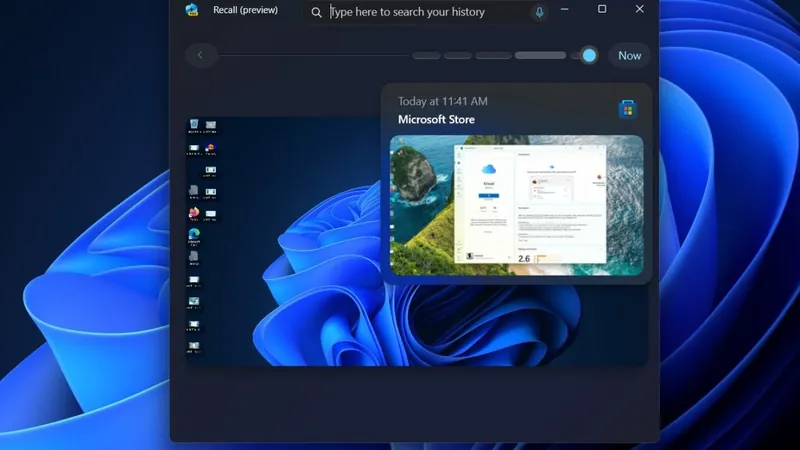
Microsoft's Recall Feature Returns: A Privacy Nightmare Revisited?
2025-04-11
Author: Jessica Wong
Users Groan as Microsoft's Controversial AI Tool Resurfaces
Security and privacy advocates are bracing themselves for another showdown. Microsoft's notorious Recall feature, which captures screenshots and indexes user activity every three seconds, is making a comeback in Windows 11.
First unveiled in May 2024, Recall faced severe backlash from security professionals who labelled it a goldmine for malicious insiders and cybercriminals. Privacy advocates voiced their concerns about its potential abuse, particularly in sensitive situations like intimate partner violence. They also highlighted the risk of Recall preserving disappearing content shared through secure messaging apps like Signal.
Microsoft Hits the Restart Button—But at What Cost?
After months of public outcry, Microsoft paused Recall. Yet, on Thursday, the tech giant announced its reintroduction, albeit initially available only to insiders testing the Windows 11 Build 26100.3902 preview. The service promises to revolutionize how users search for their past activities, claiming to allow easy retrieval of apps, websites, and documents by simply describing them.
Users can opt-in to save activity snapshots and must authenticate with Windows Hello to control access. Microsoft insists this feature keeps users in charge, enabling them to pause snapshot saving whenever they wish. But critics argue it's not enough to assuage growing fears.
The Not-So-Secure Reality of Recall
Even if an individual user opts out, they have no control over what happens on the devices of others. Thus, any sensitive information shared can be captured and indexed—even if the original recipient didn't opt-in. Privacy advocate Em articulated on Mastodon, "This feature will unfortunately extract your information from whatever secure software you might have used and store it on this person's computer in a possibly less secure way." This raises red flags as it opens the door for abuse and exploitation.
Moreover, this feature can potentially serve as a treasure trove for malicious entities. The wealth of data that Recall generates could easily fall into the hands of cybercriminals or be subject to legal subpoenas, rendering user safeguards practically futile.
Microsoft's Silence: A Cause for Concern?
As anticipation grows, users are left wondering why Microsoft is reviving a feature that faced such fierce opposition less than a year ago. Critics see Recall as an alarming example of 'enshittification'—the unwelcome integration of AI tools that offer minimal benefits yet pose significant risks to privacy.
With Recall set to be rolled out more widely soon, many are left questioning just how secure their information really is in this brave new world of AI-powered Windows.



 Brasil (PT)
Brasil (PT)
 Canada (EN)
Canada (EN)
 Chile (ES)
Chile (ES)
 Česko (CS)
Česko (CS)
 대한민국 (KO)
대한민국 (KO)
 España (ES)
España (ES)
 France (FR)
France (FR)
 Hong Kong (EN)
Hong Kong (EN)
 Italia (IT)
Italia (IT)
 日本 (JA)
日本 (JA)
 Magyarország (HU)
Magyarország (HU)
 Norge (NO)
Norge (NO)
 Polska (PL)
Polska (PL)
 Schweiz (DE)
Schweiz (DE)
 Singapore (EN)
Singapore (EN)
 Sverige (SV)
Sverige (SV)
 Suomi (FI)
Suomi (FI)
 Türkiye (TR)
Türkiye (TR)
 الإمارات العربية المتحدة (AR)
الإمارات العربية المتحدة (AR)